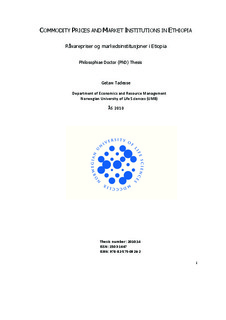| dc.contributor.advisor | Guttormsen, Atle | |
| dc.contributor.advisor | Shively, Gerald | |
| dc.contributor.author | Tadesse, Getaw | |
| dc.coverage.spatial | Ethiopia | nb_NO |
| dc.date.accessioned | 2017-02-22T16:19:04Z | |
| dc.date.available | 2017-02-22T16:19:04Z | |
| dc.date.issued | 2010 | |
| dc.identifier.isbn | 978-82-575-0926-2 | |
| dc.identifier.issn | 1503-1667 | |
| dc.identifier.uri | http://hdl.handle.net/11250/2431840 | |
| dc.description.abstract | This PhD Thesis comprises five chapters including an introduction and four separate papers. The overall objective of the thesis is to evaluate the performance of agricultural commodity markets in Ethiopia. Economists have long acknowledged the role of a properly functioning market in increasing productivity and enhancing food security. However, how to make markets work for everybody remains the concern of researchers and policymakers. In an attempt to identify market improving strategies, four separate studies are conducted. The studies apply an optimal mix of theoretical and empirical methods to derive relevant policy implications. The first study confirms that incoming food aid in Ethiopia is depressing commodity prices both in food deficit and surplus areas. The depressing effect is, however, higher for tradable commodities than non-tradable. The effect is also higher when food aid is shipped during surplus periods than during true-deficit periods. The second study evaluates the effect of speculation on price dynamics using the rational expectation theory and threshold-switching regression. The study indicates that commodity markets in Ethiopia are responsive to speculations. Speculative behaviors of traders and farmers appear to cause a structural break in the price formation process. The third paper applies principal-agent model and multinomial-switching regressions to examine the impact of interlinked contracts on smallholder’s market integration. This study concludes that interlinked contract that applies discretionary pricing motivates smallholders better than interlinked contract that uses collective bargaining with uniform pricing. The fourth paper assess the role of information uncertainty in explaining smallholders’ decision to engage in clientelism using repeated game model and binary estimation methods. The major conclusion drawn from this study is that lack of well-established market information system explains the emergence of relational market transactions. These transactions are payable in the short-term but may jeopardize the competiveness of commodity markets in the long run. | nb_NO |
| dc.language.iso | eng | nb_NO |
| dc.publisher | Norwegian University of Life Sciences, Ås | nb_NO |
| dc.relation.ispartofseries | PhD Thesis;2010:14 | |
| dc.rights | Attribution-NonCommercial-NoDerivatives 4.0 Internasjonal | * |
| dc.rights.uri | http://creativecommons.org/licenses/by-nc-nd/4.0/deed.no | * |
| dc.title | Commodity prices and market institutions in Ethiopia | nb_NO |
| dc.title.alternative | Råvareprisee og markedsinstitusjoner i Etiopia | nb_NO |
| dc.type | Doctoral thesis | nb_NO |
| dc.subject.nsi | VDP::Social science: 200::Economics: 210::Economics: 212 | nb_NO |
| dc.source.pagenumber | 151 | nb_NO |

